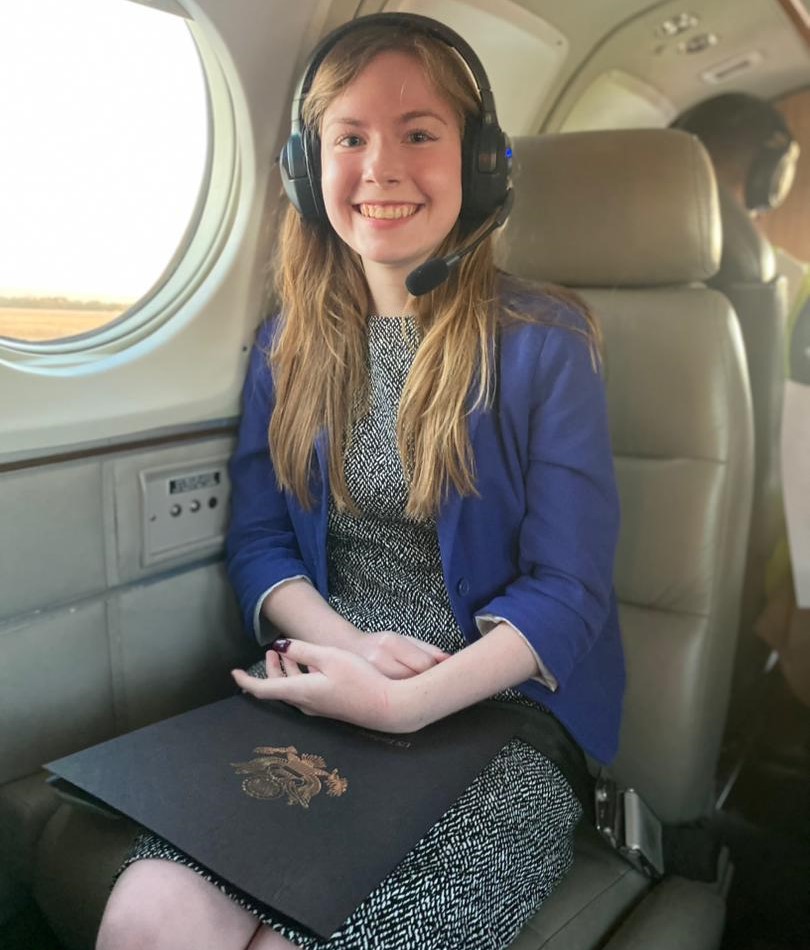
Background: Grace Tovkach graduated in 2023 with a combined degree in International Studies and Dual Languages: French and Russian Specialization. She currently works as Alumni Outreach Engagement Specialist, U.S. Department of Defense, Washington, D.C., after completing a diplomatic fellowship at the Department of State, which took her first to the Office of East African Affairs in D.C. and then overseas to the political-economics section of the U.S. Embassy, Gaborone, Botswana. In Grace’s own words, “Defense diplomacy and military cooperation are a different animal, especially as a civilian, but you meet a lot of interesting people. My job is essentially to liaise with overseas military and security officials to improve African security (and U.S.-Africa relations).”
What are one or two of the more rewarding aspects of your job?
Maybe superficial, but travel. I get to see at least one new country every year for work, usually more.
To the extent that you’re aware, how did your skills and knowledge figure into your landing the position?
At the Department of State, I did a fair amount of monitoring, analysis, and reporting of both China and Russia/Wagner-Africa issues, which entail a good deal of the current African security scene. So, I got this position at Defense because I was conversant on that and because I was not new to U.S.-Africa affairs. However, I wouldn’t have wanted to look at what Russia does in Africa in the first place had I not studied Russian, and the language skills made that all a lot easier. Somebody said, “You speak Russian, why don’t you go,” and I got thrust in a meeting, and from that I found a niche.
How, if at all, do the skills and knowledge you acquired from the Russian studies major contribute to your current job performance?
Having studied Russian and Russia-Africa affairs usually makes my work more interesting! One time, in the absence of a common language to speak, a Mozambican official and I ended up just speaking Russian to each other because he had done some training over there. Most importantly, cultural diplomacy skills from having studied abroad in Kyrgyzstan and Armenia help a lot in my job as I am constantly doing engagement work–and it’s good to know when to play up the cheerful American vibes versus tone it down. [NB: Grace was among the first UF students to explore study-abroad opportunities beyond Russia—going to Bishkek, Kyrgyzstan during the first summer of the Covid-19 pandemic, then spending a semester taking classes remotely from Yerevan, Armenia—both countries quite friendly to Russian-language speakers—MSG]
What other impacts, practical or otherwise, have come from your decision to study Russia/Russian?
Russian study has always made me the most interesting friends, whether at home or abroad! It’s been a while since I was in Gainesville, but I do have a nice group of Russian-speaking friends up here. They are curious, smart, and a blast to hang out with. Currently, I am also in a “Lessons Learned from the Russo-Ukraine War” course at the DoD Eisenhower School, and I have gotten to brief senior defense brass on my Ukraine-Africa and Russia-Africa research, as well as meet Ukrainian army officials to talk strategy. It’s been fascinating and the Russian has obviously helped a lot.
What words of advice do you have for students just now taking up Russian studies?
You need to just pack a bag and go live somewhere Russian-speaking. It’s not the only way to learn, but it’s the best way to learn, especially if you can get grants for it. Show people that Americans are curious, rather than ignorant, and that we care enough to learn about another (former Soviet or not) culture. Prove that we care so much that we will speak the language beautifully and respectfully! And meet people who can teach you how to make borscht or khachapuri, and you’ll be the best dinner party guest.
